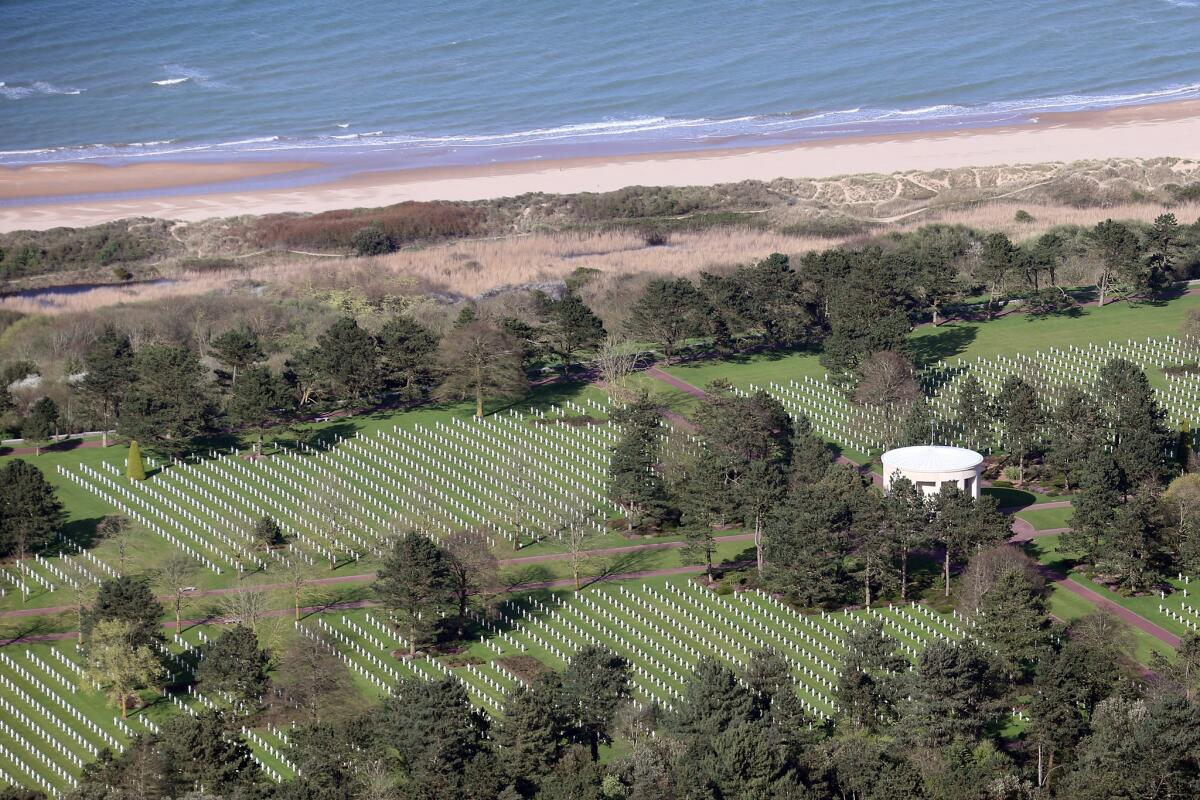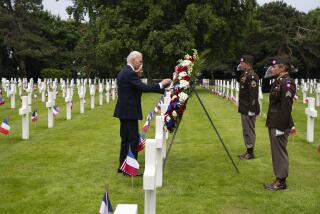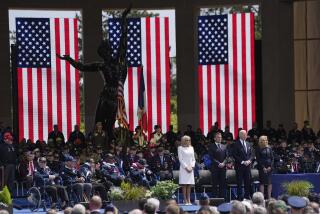Opinion: The L.A. Times on D-day 1944: ‘The cost ... will be heavy’

- Share via
With Friday’s ceremonies marking the 70th anniversary of the D-day invasion, which was a turning of the tide in World War II, I thought I’d look at what The Times’ editorial page had to say about it on June 6, 1944.
The good news: We backed the invasion.
It makes for interesting reading, especially to sense the emotions of the time. Baldly anti-German, the editorial meanders a bit, and feels somewhat like a modern-day cable news anchor trying to fill time during a breaking story, but not having many details. In this case, the editorial reads as though the writer was assigned a certain number of words to fill space on the page, but didn’t yet know what was happening an ocean, and a continent, away.
Saturday I’ll post the follow-up editorial — history in real time.
Los Angeles Times
June 6, 1944
The Invasion Has Started
The United Nations’ thrust against Hitler’s Atlantic fortress has started. In a sense, of course, it has been underway for months. What is it but invasion when planes carrying 40,000 to 50,000 armed men range over a country, hammering military targets with bullets, incendiaries, shells and bombs with a total weight that now has run into astronomical figures? The answer is that that is invasion; but what has now started is invasion plus occupation.
One thing the public must not forget for a moment is that this is a two-front war in a very real sense — the fighting front and the home front. Our soldiers now streaming into Europe will need all of everything that we can supply — food, munitions, airplanes, tanks, medicines, bandages. They will need far more than we have ever needed in the past and we must work harder, faster and longer than we have ever worked before to furnish it.
There will be no holding back by the armed forces; there must be no holding back here.
With all due respect to Alexander de Seversky and others of like mind, who consider that conquest and reduction of an enemy’s homeland may be accomplished by air action alone, the soldier on the ground is still the final winning factor in war. He may but give the coup de grace to a foe already knocked out by other means; but he is needed for that. Airplanes fly too fast to give the detailed attention to specific localities that must needs be given if they are not to revive as bases for future enemy action. It is not their capture that counts, it is their possession to insure that they cannot be used by the enemy.
To say that this invasion of Festung Europa has for its object the conquest and disinfection of a plague spot that spawns war is to say the obvious. For 2000 years the Germanic tribes occupying North Central Europe have been a periodic source of danger to their neighbors. It was the superficial view of some historians that the clashes between the Roman Empire and the Teutonic barbarians were, after all, but the rivalry of marauders bent on loot. That the Romans did a vast deal of looting cannot be denied; they despoiled nation after nation and carried its wealth back to Rome. But the Roman legions were also a cultural and civilizing force, builders and educators as well as exploiters. The great German tide ebbed and flowed and ebbed again across Europe without ever leaving anything of permanent value in its wake. It is not for nothing that the English language uses the word “vandalism” to describe wanton and ruthless destruction. The original Vandals were German. But in nearly every place the Romans ever held for any length of time the predominant spirit is still that of industry and peace, not a love of rapine and plunder.
The Roman citizen, even under the most despotic of emperors, felt himself a citizen rather than a subject. The German, on the other hand, has been all through history a willing slave to some tribal chief.
If this invasion can cure that situation it will be worth all it will cost.
The cost, no one doubts, will be heavy. Hitler’s fortress has been battered, millions of his best troops have lost their lives, his materiel has been vastly reduced, he is short, in a relative sense, of nearly everything needed to make war. But this reduction has been relative only. There still remains to him a vast store of strength, and that other kind of strength born of desperation.
The Nazis are cornered rats, and the amount of damage a cornered rat can do is proverbial. There is no hope of saving any part of their regime through surrender; they know if they quit they are through. This is not to say there is no hope, or even likelihood, of a German collapse, but there will be no German collapse if the Nazis have their way. Their only chance is to fight to the last man.
However, there is all through the record a German tendency to quit when the going becomes really tough; the most ferocious of the Teutonic tribesmen used to grovel at the feet of the Caesars, once they were beaten. The typical German knows neither how to be magnanimous in victory nor courageous in defeat; so that it is not unlikely that when the German high command realizes it cannot stem the invasion tide it will liquidate the Nazi crew and whine for mercy.
The real test of the United Nations statesmanship and foresight will come at that moment.
More to Read
A cure for the common opinion
Get thought-provoking perspectives with our weekly newsletter.
You may occasionally receive promotional content from the Los Angeles Times.







